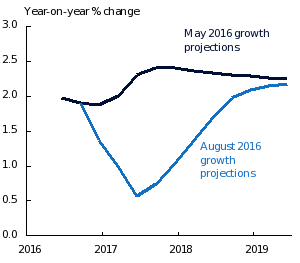As expected, the Bank of England (BoE) delivered a significant dose of monetary stimulus at its latest meeting on 4 August 2016. The stimulus package involved a 25 basis point (bp) cut to the policy rate to 0.25%, the lowest in the Bank’s 322-year history, and a restarting of the quantitative easing (QE) programme to reduce interest rates on long-term government and corporate bonds. It also included a term funding scheme with the aim of ensuring that the cut in rates is passed on to households and companies. The Bank hinted that further action is likely to be warranted later this year. The sizable stimulus came in response to the worsening economic outlook in the UK following the unexpected Brexit vote. But while monetary stimulus can alleviate some of the negative effects of Brexit, it cannot eliminate the shock completely. After all, monetary policy cannot generate new trade deals or compensate for the lost productivity or slower labour force growth that is likely to ensue in a post-Brexit Britain.
Early signs suggest that the UK economy has experienced a broad-based slowdown since the Brexit vote. Most of the evidence takes the form of surveys, as hard data are published with a lag. But the evidence so far has been damning. Consumer confidence in July fell to the lowest level since end-2013. Purchasing Managers Index (PMI) surveys point to shrinking manufacturing, services and construction sectors in July, with the contraction in the latter two being the largest since the global financial crisis,at least.
The slowdown in the economy is expected to persist. The uncertainty shock is unlikely to go away given that the UK has not even initiated discussions with the European Union(EU) on post-Brexit arrangement, which could take up to two years. As a result, the Bank of England has revised down its growth outlook for the UK economyby a cumulative 2.5 percentage point up to 2019. This is the largest quarterly revision for nearly two decades, a sign of the magnitude of the shock that Brexit represents. In terms of employment, this means more than 250k jobs lost as a result of Brexit, according to the BoE projections.What is more, the new revised numbers incorporate the sizable monetary easing package just introduced.
The Bank of England growth forecasts have deteriorated since the Brexit vote

Sources: Bank of England, Haver Analytics and QNB Economics
So what did the Bank of England do exactly? It decided to lower short-term interest rates by 25bps to 0.25%. It has also aimed at lowering long-term rates by restarting its QE programme with GBP60bn of UK government bond purchases. This is hoped to reduce thehousehold and corporate debt service burden immediately since 50% of mortgages and 80% of bank loans to firms have floating rates, which are linked to short and long-term benchmark rates. In addition, the BoE will buy GBP10bn of corporate bonds with the aim of reducing financing costs for companies and to encourage further issuance of corporate bonds as an alternative means of funding to bank loans. Finally, the BoE is initiating a new scheme to provide banks with cheap funding to ensure that lower interest rates are transmitted to new loans to households and firms.
The BoE has also signalled its intention to provide more stimulus later this year if its forecasts turn out as expected.But it has categorically ruled out the prospect of implementing negative interest rates in the UK. This is probably influenced by the not-so-successful experience of negative rates in the Euro Area and, especially, Japan. The governor of the BoE clearly stated his belief that the effective lower bound for interest rate is close to, but above, zero.
Will the new easing package succeed in picking up the UK economy?The new measures could help reduce the borrowing costs for households and companies,but this is marginal. After all, the shock experienced by the UK economy is not financial but structural. Monetary policy cannot generate new trade deals for the UK, shed more clarity about what the UK will look like post-Brexit or compensate for potential lost productivity or slower labour force growth induced by Brexit. For that, other policymakers in the UK are required to act.
